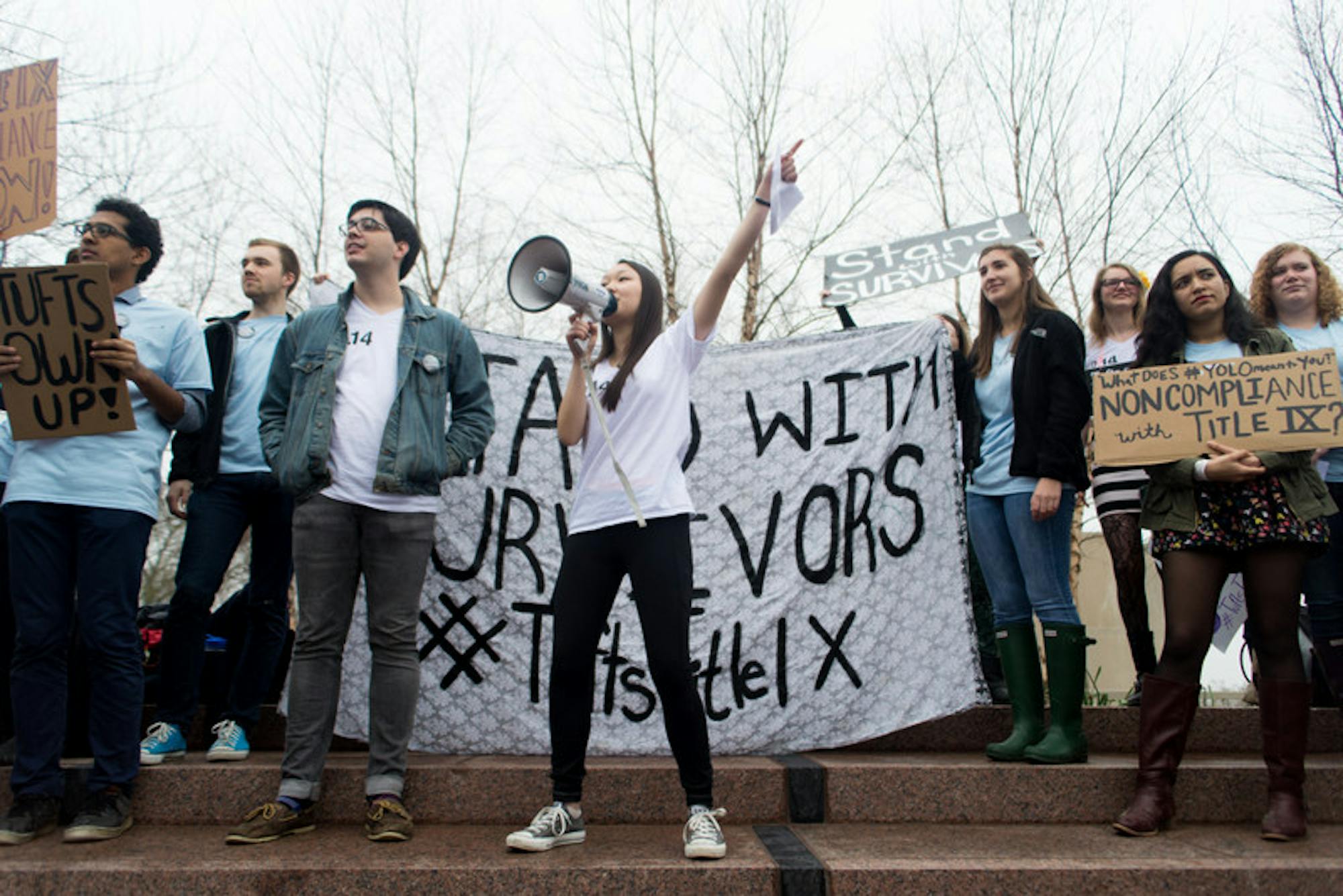Reversing Tufts' "revoked" signature from the university's agreement with the Department of Education's Office for Civil Rights , University President Anthony Monaco said he has made 22 changes that bring the school's sexual assault policy into compliance with Title IX.
The Department of Education is in the process of reviewing those revisions, all of which Assistant Secretary for Civil Rights Catherine Lhamon detailed for Monaco when they spoke on the phone April 30 - two days after the OCR announced Tufts was in violation of Title IX, the federal law that bans gender discrimination on campus. If the OCR approves these adjustments, it will indicate Tufts has a "corrected noncompliance."
Policy revisions include training all individuals on Tufts' three campuses about sexual assault, hiring two new positions - a confidential coordinator and an education specialist - and explicitly stating certain elements of the sexual assault procedure that are already in place but are not listed, Monaco said. Monaco said he resolved the contested areas in fewer than 48 hours.
"I would have preferred if we were to make the changes, submit them and then we wouldn't have had this issue," Monaco said. "It just doesn't seem [like] an unreasonable thing to ask, given that the changes were not things that took months to plan and implement."
After meeting with Lhamon in Washington, D.C., on May 8, Monaco said he has agreed to allow the OCR to continue monitoring and reviewing the university as it makes further changes to its sexual assault policy.
Following a four-year investigation into a student-filed Title IX compliant in 2010, Tufts had signed a voluntary agreement with OCR on April 17. Tufts "revoked" its signature on April 26 after the OCR notified the university that its current sexual assault policies violated Title IX. The university has said it would not have signed that agreement if it had been aware of its noncompliance.
The Department of Education, however, contests that assessment, stating Tufts has been aware of the circumstances since they signed.
"The reason that we revoked the agreement is because we wanted to be able to talk to them about it," Monaco said. "We weren't trying to defy their authority in this matter."
News broke about Tufts' noncompliance a day before the White House released guidelines for how colleges should handle sexual assault on April 29. There have been a number of highly publicized sexual assaults at colleges nationwide that led to President Obama's creation of a task force to address campus rape.
Two Tufts students, rising senior John Kelly and Wagatwe Wanjuki (LA '09), who have identified themselves as survivors of campus sexual assault, attended the April 29 events in Washington, D.C., where they spoke with several politicians about Tufts' related policies. Later in the week on May 1, Kelly helped lead the school's largest protest since the late 1980s.
"How did it feel to be named by the federal government to be not protecting your students?," Kelly said at the rally, which began on the Tisch Library Roof.
Outside the Medford/Somerville campus' administrative offices in Ballou Hall, more than 100 students marched and chanted around the building for over three hours, protesting the university's noncompliance with Title IX and its handling of sexual assault in general.
Leading to a joint statement from administrators and the student protest organizers who met as the rally unfolded, the protest marked the culmination of a week-long social media campaign in which students voiced their support for survivors of sexual assault on campus.
"The university regrets that recent events had the unintended consequence of causing some members of our community to feel unsupported," the statement reads. "The conversation did not begin today and must not end today."
Although several elements of their discussion remained unresolved, the university made several promises, including requiring the Office of Equal Opportunity to notify individuals when the adjudication process takes longer than 60 calendar days.
Students have long criticized the length of time it takes Tufts administrators to resolve sexual assault reports. While the OCR recommends universities conclude all sexual assault reports in 60 days, Tufts has, in some cases, taken between 120 and 210 days to complete this process, Kelly said. It's a duration, Monaco said, that can be attributed to breaks in the school year, finals period and summer.
But this duration of cases was not among the issues OCR found to be in violation of Title IX. Rather, in the letter of findings the OCR sent to Monaco on April 28, the Department of Education faulted the time Tufts takes to respond to each report and the lack of clarity regarding to whom students can speak about the investigation and procedures, as well as what academic and housing adjustments survivors can request.
The Department of Education is currently investigating 55 universities, not including Tufts, for Title IX compliance issues. Concluding these investigations with a "voluntary resolution agreement" - what Tufts signed on April 17 - is par for the course. The University of Montana and the State University of New York System also went through this process after issues arose with their Title IX compliance.
But Tufts is the first and only school to have "revoked" its agreement, Department of Education press secretary Dorie Nolt told the Daily in an email.12
Tufts works to remedy Title IX violation






